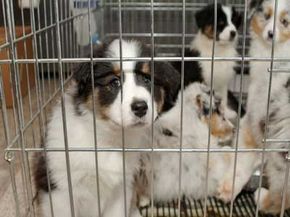Whenever cold and flu season kicks off in the fall and winter, sickness can spread through schools and daycare centers like a fire in a drought-stricken forest. All it takes is a spark -- one sniffling child who sneezes, coughs and effectively launches bacteria and viruses into the air for others to inhale -- to start a mini epidemic. Something similar happens at dog kennels, grooming facilities and pet stores, where multiple dogs reside in close quarters. Those confined environments with increased dog-to-dog contact and less circulated air are prime real estate for an upper-respiratory infection called kennel cough.
Like the common cold in humans, kennel cough spreads quickly among groups of dogs. The illness is a type of bronchitis called infectious tracheobronchitis that occurs most frequently in dogs and is characterized by a hacking cough. Although a dog with kennel cough may have a diminished appetite and run a low fever, the dog usually recovers in a couple of weeks.
Advertisement
Kennel cough is caused primarily by the bacteria bordetella bronchiseptica. In addition, canine adenoviruses Type 1 and Type 2 may accompany the bordetella. The reason that kennel cough passes so easily among dogs is that these infectious particles are airborne. When a sick dog begins coughing, that action spews the bacteria and viruses into the air. Moisture, dust and mold particles then transport the bacteria and virus, and another pooch unwittingly inhales them. Once inside the body, the bordetella cells irritate the mucociliary escalator in a dog's respiratory tract. The mucociliary escalator refers to the hairlike cilia cells coated in mucus that trap infectious particles before they enter the lungs and prompt coughing or swallowing. When the bacteria and virus enter that area, they irritate and damage those mucous and respiratory tract cells.
If you pick up your beloved dog from a boarding shelter after a vacation, it's undoubtedly disturbing to discover that he or she has caught this form of bronchitis. Fortunately, kennel cough's bark is louder than its bite.
Advertisement



